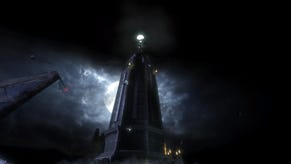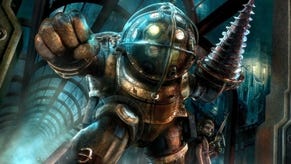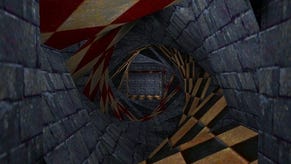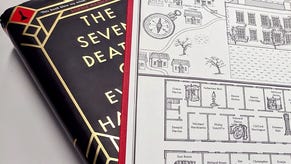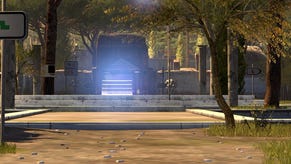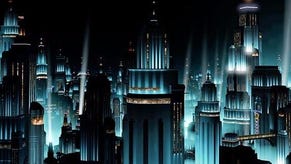BioShock 2
Water of discontent.
Adoption allows you to seek out specific corpses within the surrounding area and then set your little friend down to gather ADAM from them with her cute little syringe gun, and while she does this you must use your wiles to defend her from splicers driven to rage by the sound of the gathering. Far from repeating the frustrating missteps of the penultimate escort mission section of the first BioShock though, these showdowns are more in line with its excellent siege sections, like the battle with Ryan's forces at the labs in Arcadia, encouraging you to lay down trip wires, cyclones and other booby traps and use your considerable arsenal to defend rather than attack.
Once your Little Sister has done her quota of gathering for a level, you can then return her to a vent, where you are once again given a choice to save or harvest. Saving her offers less ADAM, but rewards down the line may be greater. Whatever you decide, once you have helped a few Little Sisters to escape from the area then Lamb sends one of her foot-soldiers after you: a Big Sister. Fast moving, skeletal and aggressive, they announce their impending arrival with a sequence of banshee wails, giving you just enough time to locate a suitable battleground where the terrain favours you. Or not.
These new overlapping systems add greater depth to the standard gameplay loop, but initially BioShock 2's mechanics and level designs struggle to stand out. Plasmids and weapons are different but largely familiar ideas, while environments are visually more detailed than their predecessors but functionally not, and the setups they use are equally worn: new splicers spawning to startle you when you pass back through an area, or hidden caches host to random side-stories caught on tape. Even the fact that you are a Big Daddy isn't really a change: after all, you became more powerful than the Big Daddies in the first BioShock.
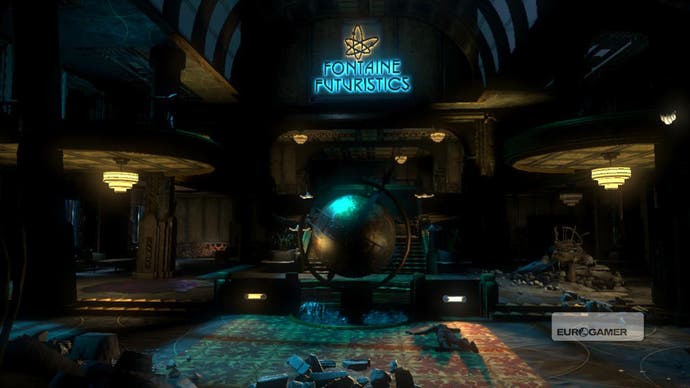
There are even occasions in the first few hours of the game when you worry the absence of new ideas may be terminal, as the developers seem to rattle through almost exactly the same beats. There's the city rising out of the gloom for the first time in profile, there's zapping a pair of splicers in a pool of water with your first dose of electro-bolt, there's getting trapped in a room by the enemy, left to be disposed of by machinegun-wielding splicers only to escape more by luck than judgement.
But the pressure of repetition soon eases, and the new, modified rhythm beds down well as you scratch around for the means to take down the next Big Daddy, then to fight through the next gathering, then to tackle the next Big Sister. The key is the distinct combat situation each component of the cycle represents: the meeting of two lumbering giants decided by brawn and evasion; the careful planning and execution of a territorial defence; and the frantic scrabbling for sure footing and exclusive vantage points.
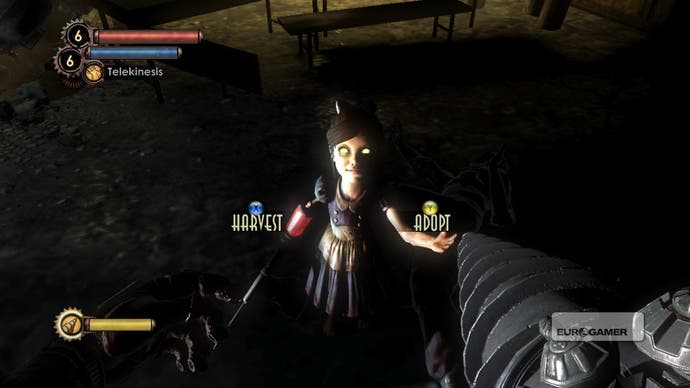
These clearly defined sequences complement the ongoing battle against splicers - who are themselves supported by new breeds, including the extremely tough brutes - and the variety of circumstances carefully staves off boredom and encourages you to experiment within your richer arsenal. This is something the new video research camera also does, by allowing you to unlock new skills and increase capacities by rolling the film and then performing different takedowns without repetition.
As you prowl through the streets of the excellent Siren Alley, or pore over the storied halls of Fontaine Futuristics, you also realise that what's happening to you and to Rapture is more than a footnote to these subtle but measured improvements in combat and exploration. On the contrary, your violent encounters and treasure-hunting are the foundations into which an excellent story is being laid: Lamb's altruism may be an obvious counterpoint to Ryan's rational self-determination, but as one character points out in dialogue, Lamb's vision for the city is more startling and abhorrent. It takes you to far darker places.


